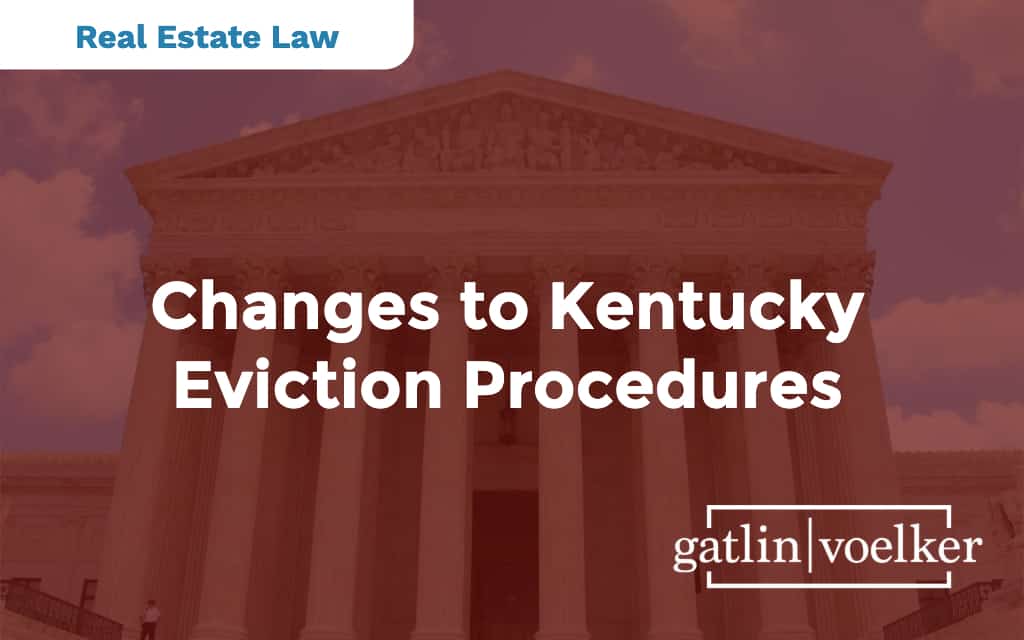Written by Emily Walters
This article was originally published in the February 2021 edition of Lex Loci, the Northern Kentucky Bar Association’s newsletter.
Thomas Jefferson famously wrote in the Declaration of Independence that all men were endowed by the Creator with unalienable rights, among which are “Life, Liberty, and the Pursuit of Happiness.” Jefferson modified the phrase from the writings of John Locke in his Second Treatise of Government that these unalienable rights included life, liberty, and property. Both the pursuit of happiness and the right to property have faced a fair number of challenges thanks to the COVID-19 pandemic. Landlords and tenants had a wacky year, and 2021 is starting out in the same vein.
Evictions became a hot topic throughout 2020. Residential and commercial tenants alike called for help with paying rent after severe economic consequences and unprecedented losses in employment. Landlords became concerned with maintaining properties without receiving rent. Representing landlords, property managers, and tenants in 2020 required keeping tabs on ever-changing eviction moratoriums, possible aid resources, Centers for Disease Control (“CDC”) declarations, and new compliance procedures. This article seeks to aid attorneys representing landlords and tenants by reviewing the extra steps needed before an eviction is granted, which may require additional evidence introduced at a hearing.
The CDC’s Order and Declaration, titled “Temporary Halt in Residential Evictions to Prevent the Further Spread of COVID-19,” 85 Fed. Reg. 55, 292 (Sept. 4, 2020), was introduced after a national eviction moratorium expired. Congress extended the CDC Order through January 31, 2021 and may well extend the Order through spring of 2021(1).
The CDC Order supplied stability while creating more confusion. It, along with any statute, executive order, Supreme Court Order, or federal order or program, does not suspend or excuse the duty to pay rent or comply with the terms of a lease. However, the use of eviction or forcible detainer as a remedy to nonpayment has been limited through a combination of actions of the CDC, Congress, Governor’s executive orders, and Supreme Court orders.
While these actions stand to reduce the number of evictions, especially those related to nonpayment of rent due directly in part to the pandemic, evictions are still happening. Landlords continue to be creative with nonrenewal of leases, defaulting to month to month, and negotiating partial payment agreements.

The CDC order halts residential evictions for “covered persons” based on a finding of nonpayment of rent. The tenant is required to sign a declaration under penalty of perjury that they are a “covered person” such that they have made best efforts to obtain assistance, earn less than $99,000 annual income (or received a stimulus check under the CARES Act), is unable to make full payment due to substantial loss in income or hours worked (or has extraordinary out-of-pocket medical expenses) and that eviction would likely render the person homeless or living in close quarters in some new shared living setting. The CDC provides a declaration form on their website.
The CDC Order does not apply to states or municipalities that have afforded greater protections, such as a full moratorium on all evictions. Since releasing the Order, the CDC also released a Frequently Asked Questions (“FAQ”) information sheet to help interpret the Order(2). The FAQ specifically states that evictions are allowed for other reasons, such a commission of a crime while on the premises or damaging the property. Again, the obligation to pay rent is not excused.
The Supreme Court of Kentucky’s Amended Order 2020-72 addressed eviction procedures by extending the ongoing requirement for the new form AOC-1027, titled “Verification of Compliance with CARES Act.”(3)
This form is to be completed and filed with any action initiating an eviction, whether residential or commercial. Form AOC-1027 requires lessors to certify the type of dwelling and that the reason for eviction is not tied to nonpayment of rent, fees, penalties, or other charges. This new form includes instructions to determine if the property is a “covered dwelling.” Commercial property is not covered and evictions for reasons other than nonpayment of rent are likewise not covered. However, the Verification of Compliance form is still needed.
Under the Supreme Court Order, the parties, at the initial hearing, are to be verbally informed that agencies may be able to help tenants with payment and help landlords with recouping missed or late payments. The proceedings are placed in abeyance for fourteen days and reset on the next available court date. The only exceptions are (1) a failure to appear after proper service by the tenant; (2) the parties reach a settlement and file an AOC-210, Forcible Detainer Settlement Agreement; or (3) the landlord elects to dismiss the complaint.
With added forms signed by both tenants and landlords seeking eviction, as well as a possible two-week hiatus on each eviction proceeding, evictions are taking longer. The forcible detainer remedy and eviction proceedings were designed to be “summary proceedings.” Baker v. Ryan, 967 S.W.2d 591, 593 (Ky. 1997). Generally, discovery and triable issues are limited, and judgment is prompt. Id. Landlords and property managers now need patience.

A tenant who signs the CDC Declaration may still face eviction. Eviction can be granted for reasons other than nonpayment of rent or termination of a month-to-month lease. This could include violations of lease terms such as unauthorized tenants, damage to property, criminal activity, violation of building codes or health ordinances, or threatening the health or safety of other residents. As such, judges are even more likely to examine each eviction on a case-by-case basis. A written and signed lease agreement can be helpful.
More evidence may be needed at the hearing to prove that forcible detainer is necessary for reasons other than the nonpayment of rent or fees. This may include testimony of other residents. The CDC’s FAQ released in October 2020 also clears landlords to question or prove the invalidity of matters asserted in the tenant’s declaration. Prior to a hearing, attorneys may need to discuss with the court the taking of evidence on the issue of nonpayment of rent with a false declaration, even if only to get the evidence on the record for future appeals. Bringing a copy of the CDC’s FAQ to the hearing may help. Likewise, tenants need to understand the legal consequences of supplying false information on the CDC declaration.
Attorneys representing parties in eviction proceedings face other common pitfalls. Most attorneys think the District Court is the court of jurisdiction for Kentucky evictions; however, the District Court’s jurisdiction is not exclusive. If the amount in controversy exceeds the $5,000 threshold, the Circuit Court has subject matter jurisdiction. Anthony v. McLaughlin 566 S.W.2d 581, 585-586 (Ky. App. 2018). Commercial evictions are most likely to fit in this category.
Property managers or building managers cannot prepare and file a Petition for Forcible Detainer on behalf of a lessor who is a corporation, LLC, or other housing agency. Any such filing or appearance in court for the eviction proceeding is considered the unauthorized practice of law. Meinshausen v. Friendship House of Louisville, Inc., 607 S.W.3d 199 (Ky. App. 2020), Hornsby v. Housing Authority of Dry Ridge, 566 S.W.3d 587 (Ky. App. 2018).
The parties should also keep in mind whether the leased property is in a jurisdiction that has adopted the Uniform Residential Landlord and Tenant Act (URLTA) under KRS Chapter 383. URLTA provides uniformity to tenant and landlord obligations and procedure prior to the filing of a Forcible Detainer Action. Locally, URLTA has been adopted by the cities of Covington, Bromley, Dayton, Bellevue, Florence, Ludlow, Melbourne, Newport, Silver Grove, Southgate, Taylor Mill, and Woodlawn. This covers significant portions of Kenton and Campbell Counties. While URLTA has not been adopted everywhere, the spirit of the law is often applied. Likewise, housing subsidized through various HUD programs may by subject to further regulations.
Recovery of past due rent payments is not an aspect of the summary proceedings in a forcible detainer action but, instead, falls under a separate action based on contract. Recovery of damages may depend on the terms of the lease and URLTA.
Pitfalls for landlords and tenants alike can be avoided with proper legal representation and well-written lease agreements. Staying abreast of changes can help both landlords and tenants keep a working and valued relationship. The pandemic has been marked with constant changes and only the future knows which changes will stay in our collective pursuit of happiness(4).
Need help determining your rights in a landlord-tenant situation involving an eviction? Contact Emily Walters for an appointment.
Endnotes: 1. https://www.federalregister.gov/documents/2020/09/04/2020-19654/temporary-halt-in-residential-evictions-to-prevent-the-further-spread-of-covid-19. 2. https://www.cdc.gov/coronavirus/2019-ncov/covid-eviction-declaration.html. 3. https://kentucky.gov/Pages/Activity-stream.aspx?n=KentuckyCourtofJustice&prId=194. 4. Other sources generally relied on: Jesse Brewer, kylandlordlaw.com; Lexington Fair Housing Council (lexingtonfairhousing.com); Greater Cincinnati Northern Kentucky Apartment Association (gcnkaa.org).
Emily Walters – Experienced Litigation Attorney
If you have questions around eviction laws or landlord and tenant rights, don’t hesitate to contact Emily Walters today to discuss your situation and make an appointment.











